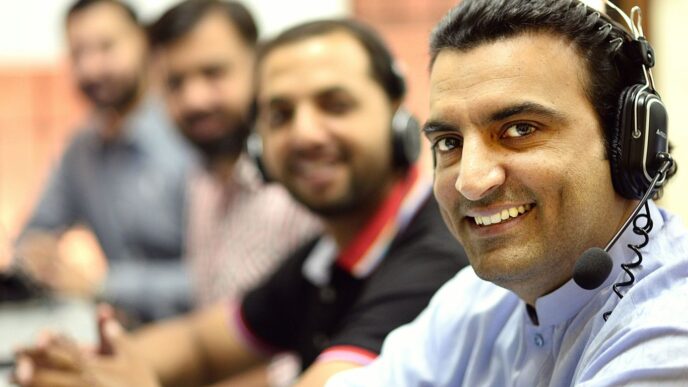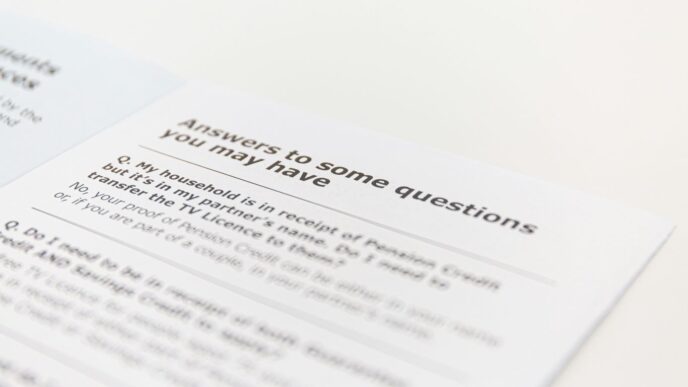Getting ready for a job interview can feel like a lot, right? You want to make sure you’re prepared, but you also don’t want to sound like you’ve just memorized a script. This guide is here to help you sort through the common questions and figure out how to answer them in a way that sounds like you. We’ve pulled together some of the most asked questions, and the goal is to give you a solid foundation so you can feel more confident when you sit down with that interviewer. Think of this as your go-to resource for tackling those tricky questions and showing them what you’re really made of. We’ll cover everything from talking about your strengths to what to do when they ask about your weaknesses, all with the aim of helping you land that job.
Key Takeaways
- Prepare for common interview questions by reviewing resources like an “50 interview questions and answers pdf” to get a clear idea of what to expect.
- Practice answering questions about your strengths and weaknesses, focusing on honesty and self-awareness.
- Use concrete examples from your past experiences to back up your claims about your skills and abilities.
- Always have thoughtful questions ready to ask the interviewer to show your genuine interest in the role and company.
- Balance being well-prepared with sounding authentic; employers want to get to know the real you.
Top 50 Interview Questions Guide
Getting ready for a job interview can feel like a lot, right? There are so many things to think about. One of the best ways to get a handle on it is to look at the kinds of questions you’re likely to be asked. We’ve put together a list of the top 50 interview questions that pop up a lot.
Thinking through these common questions beforehand can really make a difference in how confident you feel. It’s not about memorizing answers word-for-word, but more about understanding what the interviewer is really trying to find out.
Here’s a peek at some of the areas these questions cover:
- About You: Questions like "Tell me about yourself" or "What are your strengths and weaknesses?" are standard. They want to get a sense of your personality and how you see yourself.
- Your Experience: Expect questions about your past jobs, projects you’ve worked on, and challenges you’ve faced. Think about specific examples you can share.
- Behavioral Scenarios: These are questions that start with "Tell me about a time when…" They’re designed to see how you’ve handled situations in the past, which can predict how you’ll act in the future.
- Your Goals: Interviewers often ask about your career aspirations and why you’re interested in this particular role and company.
Preparing for these questions means digging into your own experiences and figuring out how they relate to the job you’re applying for. It’s a good idea to jot down some notes or even practice saying your answers out loud. You can find more details on how to approach these questions in a comprehensive list of common interview questions.
Remember, the goal is to show them you’re a good fit for the job and the company. Thinking about these 50 questions is a solid step in that direction.
50 Interview Question and Answers
Alright, let’s talk about those 50 interview questions. You know, the ones that seem to pop up no matter where you apply. It’s not about memorizing perfect answers, but more about having a solid game plan for how you’ll respond. Think of it as building a toolkit for your brain.
When they ask you to "Tell me about yourself," they’re not looking for your life story. Keep it focused on your professional journey and how it connects to the job you’re interviewing for. Highlight a few key experiences or skills that make you a good fit. A quick, relevant summary is way better than rambling.
Then there’s the classic "What are your strengths and weaknesses?" For strengths, pick things that directly relate to the job description. Got a knack for organizing projects? Mention it and give a quick example. For weaknesses, it’s a bit trickier. Don’t say you have none – that sounds fake. Instead, pick something minor that you’re actively working on. Maybe you used to get bogged down in details, but you’ve learned to manage your time better. It shows self-awareness and a willingness to improve.
Here are a few common question types you’ll want to prep for:
- Experience-based questions: These dig into your past roles. Think about specific projects, challenges you overcame, and what you learned.
- Behavioral questions: These often start with "Tell me about a time when…" They want to see how you handle situations. Use the STAR method (Situation, Task, Action, Result) to structure your answers.
- Situational questions: These present a hypothetical scenario. They want to know how you would act. Think logically and explain your reasoning.
- Questions about the company: This is where your research pays off. Why this company? What do you know about us? Show them you’ve done your homework and are genuinely interested.
Don’t forget to prepare a few questions to ask them, too. It shows you’re engaged and thinking about the role seriously. Asking about team dynamics or growth opportunities is usually a safe bet.
Behavioral Interview and Answers
So, behavioral interviews. They’re a big deal in job hunting these days. The whole idea behind them is that how you acted in past situations is a pretty good clue to how you’ll act in future ones. Makes sense, right? Instead of just asking if you can do something, they want to see proof that you have done it.
These questions usually kick off with something like, "Tell me about a time when…" or "Describe a situation where…" They’re not looking for a simple yes or no. They want a story. A real-life example from your work history that shows off a specific skill or trait. Think about times you’ve had to deal with a difficult coworker, solved a tricky problem, or maybe even messed something up and learned from it. The STAR method is your best friend here: Situation, Task, Action, Result. It helps you structure your answer so you don’t ramble.
Here’s a quick rundown of what they’re often trying to figure out:
- Problem-Solving: How do you tackle unexpected issues? Do you freeze up, or do you jump in and find a solution?
- Teamwork: Can you play nice with others? How do you handle disagreements or contribute to group efforts?
- Leadership: Even if you’re not in a management role, they might ask about times you took initiative or guided others.
- Adaptability: How do you handle change or unexpected shifts in plans?
- Communication: Can you explain things clearly? How do you handle difficult conversations?
It can feel a bit like an interrogation sometimes, but remember, they’re just trying to get a clear picture of who you are as an employee. Preparing a few solid examples using the STAR method for common behavioral themes will make a huge difference. It’s way better than trying to make something up on the spot.
Interview Questions for Freshers
So, you’re fresh out of school and looking to land that first real job. It can feel a bit daunting, right? You’ve got the education, maybe some internships, but now you’re facing people who want to know if you can actually do the work. Don’t sweat it too much. Most companies hiring entry-level folks know you won’t have years of experience. They’re mostly looking for potential, a good attitude, and a willingness to learn.
When you’re prepping, think about a few key areas. They’ll want to know why you’re interested in their company and this specific job. It sounds simple, but it’s your chance to show you’ve done your homework. Did you look at their website? Do you know what they actually do? Mentioning something specific you admire about them, like a recent project or their company values, goes a long way. It shows you’re not just sending out a hundred resumes blindly.
Here are some common things they’ll probably ask:
- Tell me about yourself. This isn’t an invitation to recount your entire life story. Stick to what’s relevant to the job. Talk about your studies, any projects you’re proud of, and what skills you’ve picked up that would help you in this role.
- What are your strengths and weaknesses? For strengths, pick things that match the job description. If it’s a team role, mention you’re a good collaborator. For weaknesses, be honest but frame it positively. Maybe you’re not great at public speaking, but you’ve joined a club to get better. It shows self-awareness and a drive to improve.
- Why do you want to work here? Again, research is key. Connect what you know about the company to your own goals. Maybe you admire their approach to sustainability, or you’re excited about the industry they’re in.
- Where do you see yourself in five years? They want to know if you have ambition and if your goals align with potential career paths within their company. It’s okay if you don’t have it all figured out, but show you’ve thought about your future.
They might also throw in some situational questions, like "What would you do if a client was unhappy?" or "How would you handle a tight deadline?" Think about times you’ve faced similar situations, even in school projects or part-time jobs. The goal is to show you can think on your feet and approach problems logically. It’s less about having the perfect answer and more about how you get there.
English Interview Questions and Answers PDF
So, you’re looking for a way to get ready for that big job interview, and you’ve heard about these English interview questions and answers PDFs. Honestly, they can be a pretty handy tool. Think of it like having a cheat sheet, but for your career. These guides usually break down common questions you’ll hear, like the classic "Tell me about yourself" or the slightly trickier "Why should we hire you?".
The idea is to have solid, work-focused answers ready to go. It’s not about memorizing scripts, but more about having a framework. You want to highlight what you’re good at and how it fits the job. For example, if the job needs someone organized, you’ll want to have a story ready about a time you really nailed organization.
Here’s what you can typically expect to find in one of these PDFs:
- Common Questions: A list of questions that pop up a lot, from basic introductions to more complex scenarios.
- Sample Answers: Examples of how to respond, often with advice on what employers are looking for.
- Tips for Specific Areas: Guidance on how to talk about your strengths, weaknesses, and even how to handle tricky questions about past jobs.
It’s also a good idea to look for resources that cover behavioral questions. These are the ones that start with "Tell me about a time when…" They really want to see how you’ve handled situations in the past. Having a few examples ready, like a time you worked in a team or solved a problem, can make a big difference. Downloading a PDF can be a simple way to keep all this information in one place, making your prep feel a bit more organized. It’s just about being prepared, you know?
Job Interview Questions and Answers PDF
Getting a handle on common job interview questions and answers is a big part of getting ready for your next career move. It’s not just about memorizing responses, though. It’s more about understanding what the interviewer is really asking and how you can show them you’re the right person for the job.
Think about it: questions like "Tell me about yourself" or "Why do you want to work here?" are your chance to make a good first impression. A well-crafted answer can set a positive tone for the rest of the conversation. For these, you want to keep it focused on your work experience and skills that match what the company is looking for. No one wants to hear your life story; they want to know how you can help them.
Then there are the trickier ones, like talking about your weaknesses. Instead of saying you have none (which sounds fake) or listing something that would disqualify you, pick a real, but minor, weakness. Better yet, explain how you’re actively working to improve it. For example, if you’re not the most organized person, you could mention that you’ve started using a specific planner or app to keep track of tasks. This shows self-awareness and a drive to get better.
Here are some common areas interviewers like to explore:
- Past Experiences: Be ready to talk about specific projects, challenges you’ve overcome, and successes you’ve had. Use the STAR method (Situation, Task, Action, Result) to structure these stories.
- Skills and Strengths: Connect your abilities directly to the job description. Don’t just list them; give examples of how you’ve used them.
- Company Fit: Show you’ve done your homework. Why this company? Why this role? What do you know about their mission or recent work?
- Future Goals: Where do you see yourself in a few years? How does this role fit into that picture?
Having a good job interview questions and answers PDF can be a lifesaver. It gives you a solid list to work from and helps you prepare for a wide range of topics. It’s a practical tool to make sure you don’t get caught off guard. Remember, preparation is key, but so is being yourself. Good luck out there!
Top 10 Interview Questions and Answers PDF
So, you’re looking to get a leg up on your next job interview, right? A lot of people find themselves wondering what the most common questions are and, more importantly, how to actually answer them. That’s where a good PDF guide on the top 10 interview questions can really come in handy. It’s not about memorizing answers, but more about understanding the why behind the questions and how to frame your own experiences in the best light.
Think about it. Questions like "Tell me about yourself" or "Why should we hire you?" seem simple, but they’re your chance to make a strong first impression. A solid PDF will break down how to give concise, work-focused answers that highlight what you bring to the table. It’s about connecting your skills directly to what the company needs.
Then there are the trickier ones, like discussing weaknesses or past challenges. The best guides won’t tell you to pretend you’re perfect. Instead, they’ll show you how to talk about areas for growth constructively, or how to frame a past problem as a learning experience. The goal is to show self-awareness and a willingness to improve.
Here’s a quick look at what you might find in a helpful guide:
- "Tell me about yourself.": Focus on your relevant professional journey and skills.
- "Why do you want to work here?": Show you’ve done your research and align with the company’s mission.
- "What are your strengths?": Pick strengths directly related to the job description.
- "What are your weaknesses?": Discuss a real, but manageable, weakness and how you’re working on it.
- "Where do you see yourself in 5 years?": Align your career goals with potential growth within the company.
- "Why are you leaving your current job?": Stay positive and focus on seeking new opportunities.
- "Describe a challenging situation and how you handled it.": Use the STAR method (Situation, Task, Action, Result).
- "How do you handle pressure or stressful situations?": Talk about your coping mechanisms and focus on productivity.
- "Do you have any questions for us?": Always have thoughtful questions prepared.
- "What are your salary expectations?": Research industry standards and be realistic.
Having these common questions laid out, along with suggested approaches, can really take the edge off interview anxiety. It helps you prepare your thoughts and feel more confident walking into that room.
Interview Topics in English
When you’re getting ready for a job interview, especially one conducted in English, there are a few key areas you’ll want to focus on. It’s not just about knowing the answers; it’s about how you present yourself and show you’ve done your homework.
First off, expect questions about your background and experience. They’ll want to hear about your career path, what you’ve accomplished, and how your skills match what they’re looking for. It’s really important to have specific examples ready to back up whatever you say. Think about projects you’ve worked on, challenges you’ve overcome, and successes you’ve had. Being able to talk about these in a clear, concise way is a big plus.
Then there are the behavioral questions. These often start with phrases like "Tell me about a time when…" or "Describe a situation where…". The goal here is to see how you handle different work scenarios. They’re looking for evidence of things like teamwork, problem-solving, leadership, and how you deal with pressure. Preparing for these means thinking about past experiences and how you reacted.
Here are some common types of topics you’ll likely encounter:
- Yourself: Questions like "Tell me about yourself" are your chance to give a brief professional overview.
- Strengths and Weaknesses: Be ready to talk about what you’re good at and areas where you’re looking to improve. Honesty and self-awareness are key here.
- Why This Job/Company: This is where your research comes in. Show you understand what the company does and why you’re a good fit for this specific role.
- Problem-Solving: Be prepared to discuss how you approach and solve difficult issues.
- Teamwork and Collaboration: How do you work with others? Can you be a good team player?
- Your Questions: Always have a few thoughtful questions ready to ask the interviewer. It shows you’re engaged and interested.
Having a PDF guide with common interview questions and answers in English can be a really helpful tool. It lets you practice articulating your thoughts and ensures you don’t get caught off guard. Just remember to keep your answers genuine and tailored to the specific job you’re applying for.
Digital Mock Interviews
Okay, so you’ve got your resume polished and you’ve practiced your elevator pitch. What’s next? Well, before you walk into that actual interview, it’s a really good idea to try out a digital mock interview. Think of it as a practice run, but with a bit more tech involved.
These aren’t just simple Q&A sessions. Many platforms now use AI to simulate a real interview. They can throw common questions at you, or even job-specific ones, depending on what you’re looking for. It’s a way to get comfortable with the format, especially if you’re prepping for interviews in English and want to make sure your answers sound natural. The feedback you get from these digital sessions can be surprisingly helpful.
Here’s what you can expect and why they’re useful:
- Realistic Scenarios: You’ll face questions that mimic what you might hear in a real interview, covering everything from your background to how you handle tricky situations.
- Performance Analysis: Some tools can analyze your responses, your tone, and even your body language (if it’s a video mock interview). This gives you specific areas to work on.
- Confidence Boost: The more you practice in a simulated environment, the less nervous you’ll feel when the real thing comes around. It helps you get used to thinking on your feet.
It’s like rehearsing a play before opening night. You wouldn’t just go on stage without practicing, right? The same applies here. Taking the time for a digital mock interview can make a big difference in how you present yourself and, ultimately, in your chances of landing the job.
AI-Driven Tools for Interview Preparation
It’s pretty wild how much technology is changing how we get ready for job interviews. These days, you don’t just have to rely on old-school study guides. AI tools are popping up that can actually simulate interview scenarios. Think of it like a practice run, but with a computer program that can throw all sorts of questions at you, from the common ones to stuff really specific to the job you want.
These programs can be super helpful. They can give you instant feedback on your answers, pointing out where you might be rambling or if your response wasn’t quite hitting the mark. It’s like having a coach available 24/7. Some tools even focus on specific types of questions, like behavioral ones, which can be a real challenge to answer well. They can help you structure your thoughts and make sure you’re telling a clear story.
Here’s a quick rundown of what these tools can do:
- Simulate interview environments: Practice answering questions in a setting that mimics a real interview.
- Provide instant feedback: Get immediate insights on your responses, tone, and clarity.
- Identify areas for improvement: Pinpoint specific skills or question types you need to work on.
- Offer tailored practice: Focus on questions relevant to your industry or the specific job you’re applying for.
The goal is to get you comfortable and confident, so you’re not caught off guard when the real thing happens. It’s about using these smart tools to polish your answers and present yourself in the best possible light, without sounding like you’ve just memorized a script.
Expert Tips and Techniques
Alright, let’s talk about some practical advice that can really make a difference when you’re prepping for an interview. It’s not just about knowing the answers; it’s about how you present yourself and handle the whole situation.
First off, think about structuring your answers. For behavioral questions, the STAR method (Situation, Task, Action, Result) is your best friend. It helps you give clear, concise stories about your past experiences. It sounds simple, but using it consistently makes your answers much more impactful.
Here’s a quick breakdown of STAR:
- Situation: Briefly describe the context. Where were you? What was the project?
- Task: What was your specific responsibility or goal in that situation?
- Action: What steps did you take to address the task? Be specific about your role.
- Result: What was the outcome? Quantify it if you can. What did you learn?
Another tip is to practice out loud. Seriously, talking to yourself or a friend can highlight areas where you stumble or sound unsure. You can even record yourself to catch awkward phrasing or nervous habits. It feels a bit silly at first, but it really helps.
Don’t forget to research the company thoroughly. Go beyond their ‘About Us’ page. Look at recent news, their social media, and any projects they’ve announced. This allows you to tailor your answers and ask smarter questions. Showing you’ve done your homework makes a huge impression.
Finally, think about your own questions for the interviewer. Having a few thoughtful questions prepared shows you’re engaged and serious about the role. Avoid questions that are easily answered by a quick look at their website. Ask about team dynamics, challenges in the role, or opportunities for growth. It’s a two-way street, remember?
Addressing Weaknesses Constructively
Okay, so everyone has things they aren’t great at, right? It’s totally normal. When you’re in an interview, they might ask about your weaknesses. Instead of panicking, think of it as a chance to show you’re aware and you’re working on stuff. The trick is to pick a weakness that isn’t a deal-breaker for the job you want.
For example, maybe you’re not the most organized person. You could say something like, "I’ve noticed I can sometimes get a bit swamped with too many tasks at once. To fix this, I’ve started using a digital planner and I block out specific times for different projects. It’s really helping me stay on track." See? You admit it, but then you explain what you’re doing about it. It shows you’re proactive.
Here are a few ways to think about it:
- Be Honest, But Strategic: Don’t make something up, but also don’t offer up a weakness that would immediately disqualify you. Think about skills that are important but not the absolute core of the job.
- Focus on Improvement: Always follow up with what you’re actively doing to get better. Are you taking a course? Reading books? Practicing a skill? Mentioning these actions makes a big difference.
- Keep it Job-Relevant (but not critical): If the job requires you to be a whiz at public speaking, maybe don’t say your biggest weakness is stage fright. But if it’s a role where you’ll do some presentations but it’s not the main gig, it could work if you explain your improvement plan.
It’s all about showing you can look at yourself honestly and take steps to grow. Employers like that. You can find more tips on how to frame these answers in a job interview questions and answers PDF.
Demonstrating Leadership and Problem-Solving Skills

When interviewers ask about leadership and problem-solving, they’re really trying to see how you handle challenges and guide others. It’s not just about having ideas, but about putting them into action and getting results.
Think about a time you faced a tough problem at work. Maybe a project was going off track, or a team member was struggling. How did you step in? Did you take charge, or did you help others find a solution? The key is to show you can analyze a situation, come up with a plan, and then execute it effectively.
Here’s a good way to structure your answer, often called the STAR method:
- Situation: Briefly describe the context. What was going on?
- Task: What was the specific problem or goal you needed to address?
- Action: What steps did you take? Focus on your leadership and problem-solving actions. Did you delegate? Did you research? Did you mediate?
- Result: What happened because of your actions? Quantify it if you can. Did efficiency go up? Was a deadline met? Was a conflict resolved?
For example, you might say: "In my last role, we had a project deadline that was suddenly moved up. The situation was that our team was already stretched thin. My task was to figure out how we could still deliver on time without sacrificing quality. I acted by reorganizing our workflow, reassigning some tasks to team members who had more bandwidth, and I personally took on the extra analysis work. As a result, we met the new deadline and the client was really happy with the final report."
It’s also helpful to show you can handle disagreements. If you’ve ever helped resolve a conflict between colleagues, that’s a great example. It shows you can keep things professional and focused on the team’s goals, even when people aren’t seeing eye-to-eye. Being able to manage stress during these times is also a big plus. How do you stay calm and focused when things get hectic? Talking about how you prioritize tasks or seek support can really make a difference.
Responding to Behavioral Questions
Behavioral questions are a big part of most interviews these days. They usually kick off with something like, "Tell me about a time when…" or "Give me an example of…" The idea is to get a sense of how you’ve actually handled things in the past, rather than just what you say you would do. It’s all about digging into your real-world experiences.
When you get one of these, don’t just jump in with a vague answer. Take a second to think. What situation best shows the skill they’re asking about? It’s helpful to have a few go-to stories ready that highlight different strengths, like teamwork, problem-solving, or handling pressure. You want to paint a clear picture.
Here’s a simple way to structure your answers, often called the STAR method:
- Situation: Briefly describe the context. Where were you? What was the project?
- Task: What was your specific responsibility or goal in that situation?
- Action: What steps did you actually take? This is where you detail your contributions.
- Result: What was the outcome? Quantify it if you can – numbers make a big impact.
For instance, if asked about a time you faced a challenge, you might say: "In my last role, we had a client project that was falling behind schedule (Situation). My task was to get it back on track without compromising quality (Task). I reorganized the workflow, delegated specific tasks to team members based on their strengths, and implemented daily check-ins to monitor progress (Action). This allowed us to deliver the project on time and receive positive feedback from the client (Result)." It shows you can handle real-world challenges.
Remember, they’re not just looking for a good story; they’re assessing your skills and how you operate. Be honest, be specific, and focus on what you did. It’s your chance to show them you’ve got the experience they need.
Strengths and Weaknesses
Okay, so you’re going to get asked about your strengths and weaknesses. It’s pretty much a given in most interviews. The trick here is to be honest, but also smart about it. You don’t want to bring up something that’s a total deal-breaker for the job, right?
When you talk about your strengths, pick things that really match what they’re looking for. If the job needs someone super organized, and you are, then talk about that. Give a quick example. Like, "I’m really good at keeping projects on track. In my last role, I managed a small team, and we always met our deadlines because I made sure everyone knew what they needed to do and when." See? Specific and shows you can do the job.
Now, weaknesses. This is where people get nervous. Don’t say you don’t have any – that sounds fake. Instead, pick something real, but not a core part of the job. Maybe you’re not the best at public speaking, or you sometimes get too focused on details. The important part is to explain what you’re doing to get better. For example, "I used to find presenting to large groups a bit nerve-wracking. So, I joined a local Toastmasters group, and I’ve been practicing by giving short presentations to my colleagues. It’s really helping me feel more comfortable."
Here’s a quick way to think about it:
- Strengths: Pick 2-3 that fit the job description. Have a short, real example for each.
- Weaknesses: Pick 1 that’s genuine but not critical for the role. Explain your plan to improve it.
It’s all about showing you know yourself and that you’re willing to grow. They want to see that you can handle challenges and keep learning. It’s not about being perfect; it’s about being aware and proactive.
Discussing Your Strengths with Confidence
Talking about what you’re good at in an interview can feel a bit awkward, right? It’s like bragging, but you have to do it. The trick is to be direct and back it up with real examples. Think about the job you’re going for. What skills does it need? Pick a couple of your strongest ones that match up. For example, if the job needs someone who can manage projects, don’t just say ‘I’m a good manager.’ Instead, tell them about a time you successfully led a project from start to finish. What was the goal? What did you do? What was the outcome?
Here’s a way to structure it:
- Situation: Briefly describe the context.
- Task: What needed to be done?
- Action: What specific steps did you take?
- Result: What happened because of your actions?
It’s important to show how your strengths directly benefit the company. Don’t just list skills; explain how you’ve used them to achieve positive results. This shows you’re not just capable, but also effective. Confidence is key here, but try not to sound like you think you’re the best thing since sliced bread. A little humility goes a long way. Mentioning that you’re always looking to learn and grow can balance out your confidence. It shows you’re aware that there’s always more to know, even with your strong points.
Posing Insightful Questions to the Interview Panel
So, the interview is almost over, and they ask, "Do you have any questions for us?" This is your moment, don’t just let it pass by! It’s not just about filling silence; it’s a real chance to show you’ve been paying attention and that you’re genuinely interested in the job and the company. Think of it as a two-way street. You’re not just being evaluated; you’re also evaluating them.
What kind of questions should you have ready? Forget the stuff you can find with a quick Google search. Instead, try to ask things that show you’ve thought about the role and the team. Maybe something about the day-to-day work, or how the team usually tackles projects. You could ask:
- What does a typical day look like in this role?
- How does the team handle disagreements or different ideas?
- What are the biggest challenges the team is facing right now, and how does this position help address them?
Asking about challenges is a good way to show you’re not afraid of a little hard work and that you’re thinking about solutions. It also gives you a clearer picture of what you’d be getting into. Your questions can reveal a lot about your personality and your approach to work. It’s also smart to have a question ready about professional development or growth within the company. It shows you’re thinking long-term.
Don’t go overboard with too many questions, though. Two or three well-thought-out questions are better than a long list. And remember to listen carefully to their answers – that’s important too!
Avoiding Common Interview Pitfalls
So, you’ve prepped your answers, ironed your best shirt, and you’re ready to impress. That’s great! But sometimes, even with the best intentions, we stumble into common interview traps. It’s like walking through a minefield – one wrong step and poof, your chances go up in smoke. Let’s talk about a few of these landmines so you can sidestep them.
First off, there’s the classic "too much, too little" preparation problem. You don’t want to sound like you’ve memorized a script, but you also don’t want to be caught completely off guard. Finding that sweet spot between being prepared and being yourself is key. It means knowing your stuff, understanding the company, and having solid examples ready, but delivering them naturally.
Another big one is negativity. Nobody wants to hire someone who complains about their last job or boss. Even if things were rough, try to frame it constructively. Instead of saying, "My old manager was terrible," you could say, "I’m looking for a more collaborative leadership style where feedback is a two-way street."
Then there’s the issue of not asking questions. Seriously, if the interviewer asks, "Do you have any questions for us?" and you say "Nope, I’m good," it can signal a lack of interest. You should always have a few thoughtful questions ready. Think about what you’d genuinely want to know about the role, the team, or the company culture. It shows you’re engaged and thinking ahead.
Here are a few more things to watch out for:
- Vague answers: Avoid one-word responses or answers that don’t really explain anything. Use the STAR method (Situation, Task, Action, Result) to give clear, detailed examples.
- Dominating the conversation: It’s an interview, not a monologue. Let the interviewer guide the discussion and make sure you’re listening as much as you’re talking.
- Forgetting the basics: Things like being late, dressing inappropriately, or not sending a thank-you note can really hurt your chances, no matter how good your answers are.
- Oversharing personal details: Keep the conversation focused on your professional qualifications and experiences. Stick to what’s relevant to the job.
Avoiding these common mistakes isn’t about being perfect; it’s about being aware and making a conscious effort to present your best professional self. It makes a difference.
Balancing Preparedness with Authenticity
It’s a tricky line to walk, isn’t it? You want to be ready for anything an interviewer might throw at you, but you also don’t want to sound like a robot reciting pre-programmed answers. The goal is to be yourself, just a slightly more polished version of yourself. Think of it like this: you wouldn’t go into a big presentation without practicing, right? But you also wouldn’t want to sound like you’re reading from a script the whole time. It’s the same with interviews.
So, how do you get there? Start by really knowing your resume inside and out. Be able to talk about your past experiences naturally, not just list them. Resources like an English interview questions and answers PDF can give you a good idea of what to expect. They’ll help you get familiar with common questions, from the basic "tell me about yourself" to more involved scenarios. But don’t just memorize answers from these guides. Use them as a jumping-off point to think about your own stories and how they relate.
Here’s a little breakdown of how to strike that balance:
- Know your stuff: Review common questions and think about specific examples from your work history that illustrate your skills. What projects did you lead? What problems did you solve? How did you handle a difficult situation?
- Practice, but don’t over-rehearse: Do some mock interviews with a friend or even just talk through your answers out loud. This helps you find your flow and sound more natural. You want to sound confident, not rehearsed.
- Be present: During the interview, really listen to the questions being asked. Sometimes, the best way to be authentic is to pause for a second, process the question, and then respond honestly. It’s okay to take a moment.
Ultimately, employers want to get a sense of who you are as a person, not just a list of qualifications. They want to see if you’ll fit in with the team and the company culture. So, while being prepared is super important, don’t forget to let your genuine personality shine through. It makes a big difference.
Leveraging Technology and Resources
It feels like there’s always something new to learn when it comes to job hunting, right? Thankfully, we’ve got a bunch of tech and online stuff that can really help make interview prep less of a headache. Think of it as having a whole toolkit at your fingertips.
We’re not just talking about basic websites anymore. There are some pretty neat tools out there now. For example, AI-powered platforms can actually simulate interview scenarios. You can practice answering common questions, or even get specific ones tailored to the job you’re applying for. It’s like having a practice run without the real pressure. These tools often give you feedback right away, so you can see where you might need to adjust your answers or how you come across.
Here are a few ways technology can lend a hand:
- Online Guides and PDFs: Stuff like "interview questions and answers in English" PDFs are super handy. They give you a solid list of what to expect, from general questions to more specific ones for freshers. It’s a good starting point to get familiar with the landscape.
- AI Mock Interviews: These are becoming more common. They can mimic real interviews, asking questions and sometimes even analyzing your responses for tone and clarity. It’s a great way to get used to the format, especially if you’re doing virtual interviews.
- Professional Development Platforms: Many sites offer courses or articles on interview skills, resume building, and even how to talk about your strengths and weaknesses. Some even have sections dedicated to common interview topics in English.
Using these resources can really boost your confidence and help you feel more prepared. It’s about using what’s available to get a clearer picture of what interviewers are looking for and how you can best present yourself. It’s not about memorizing answers, but about understanding the types of questions and practicing how to respond authentically.
Understand the Interview Landscape in 2025
So, what’s the deal with job interviews in 2025? Things are definitely shifting, and it’s not just about having a polished resume anymore. We’re seeing a big push towards digital skills and how well you can handle yourself in virtual settings. Think Zoom and Teams – you gotta be comfortable with that tech.
Beyond the tech, soft skills are getting a serious spotlight. Employers are looking for people who can work well with others, adapt to changes, and understand different perspectives. They’re also throwing more scenario-based questions your way, wanting to see how you think on your feet.
Here’s a quick rundown of what to expect:
- Digital Communication: Being good with video conferencing tools is a must.
- Adaptability: Can you roll with the punches and learn new things?
- Problem-Solving: How do you tackle unexpected challenges?
Interview formats are changing too. Video interviews are pretty standard now because they’re just easier for everyone. Sometimes you’ll see group interviews, especially for roles that need teamwork, and AI is popping up more to help screen candidates. In fact, candidates who’ve gone through AI-led interviews have seen a better success rate in later human interviews, which is pretty interesting AI-led interviews.
It’s a lot to keep up with, but preparing with resources like an English interview questions and answers PDF can really help you get a handle on it all. The main thing is to be ready to show who you are and what you can do, even when the format is a bit different.
Key Interview Skills
So, what exactly are the skills that hiring folks are really looking for? It’s not just about having the right degree or years of experience, though those are important. They want to see how you actually do things.
Think about communication. This isn’t just about talking; it’s about listening too. Can you explain your ideas clearly? Can you understand what someone else is asking, even if it’s a bit complicated? Being able to explain your thoughts without using a ton of fancy words is a big deal. It shows you’ve thought things through.
Then there’s problem-solving. Everyone runs into issues, right? The question is, what do you do when you hit a wall? Do you freeze up, or do you figure out a way around it? Interviewers like to hear about times you faced a problem and how you tackled it. It doesn’t always have to be a huge, dramatic fix; sometimes, it’s just about being smart and resourceful.
Here are a few more skills that pop up a lot:
- Adaptability: How well do you handle changes? Things rarely go exactly as planned, so showing you can roll with the punches is a plus.
- Teamwork: Can you work well with others? Most jobs involve some level of collaboration, so demonstrating you’re a good team player is key.
- Time Management: Can you juggle tasks and meet deadlines? This shows you’re organized and can handle your workload.
- Critical Thinking: This is about analyzing information and making good judgments. It’s like putting the pieces of a puzzle together to see the whole picture.
Basically, they’re trying to see if you can do the job, yes, but also if you’ll fit in and be a reliable part of the team. It’s about showing them you’ve got the practical skills to get things done and the right attitude to go with it.
Expected Interview Topics in English
When you’re getting ready for a job interview, especially if it’s in English, there are a few main areas they usually want to talk about. It’s not just about reciting answers from a PDF, though having one handy is a good idea. They’re trying to get a feel for who you are and if you’ll fit in.
Here’s a breakdown of what you can generally expect:
- Your Background and Experience: This is where they’ll ask about your past jobs, what you did, and what you learned. Think about specific projects or tasks that show off your skills. They might ask about your resume, so know it inside and out.
- Skills and Strengths: What are you good at? They’ll want to hear about your technical skills, but also your soft skills like teamwork, communication, and problem-solving. Be ready to give examples that prove you have these skills.
- Behavioral Questions: These are the "tell me about a time when…" questions. They want to see how you’ve handled situations in the past to predict how you’ll act in the future. Think about times you faced a challenge, worked with a difficult person, or led a project.
- Company and Role Fit: Why this company? Why this job? They want to see that you’ve done your homework and that you’re genuinely interested. You should be able to talk about how your goals align with theirs.
- Your Questions: This is your chance to show your interest and learn more. Always have a few questions ready about the team, the company culture, or the day-to-day responsibilities. It shows you’re engaged.
Being prepared for these topics means you can answer confidently and show your true self. It’s a balance between knowing what to say and being natural. Practicing out loud, maybe even with a friend, can really help you feel more comfortable. Don’t just memorize; try to understand the ‘why’ behind each question.
Common Interview Formats
So, you’re gearing up for a job interview, and you’re wondering what to expect. It’s not just one kind of chat, you know? Companies use different ways to get to know you. Understanding these formats can really help you prepare.
First off, there are structured interviews. Think of these like a test with a set list of questions everyone gets asked. They have a scoring system too, so it’s all about comparing apples to apples. This way, they try to keep things fair and see who’s got the right skills for the job. They’ll have a question bank and clear ways to judge your answers.
Then you’ve got unstructured interviews. These are more like a casual conversation. The questions might change depending on how the chat goes. It’s less about a script and more about seeing how you think on your feet and if you’d fit in with the team. They’re good for checking out your personality and how you talk to people.
Behavioral interviews are a big one. They’re all about what you’ve done before. They’ll ask you to tell stories about how you handled tough projects, worked with others, or solved problems. The idea is that how you acted in the past is a good sign of how you’ll act in the future. They often use the STAR method here: Situation, Task, Action, Result. So, you’ll want to have some good examples ready to go.
Sometimes, you might face a panel interview. This is where you talk to a group of people all at once. It can feel a bit intense, but it means they’re trying to get a lot of different opinions on you. It’s a good way for them to see how you handle talking to multiple people and how you might interact with different departments.
Here’s a quick rundown:
- Structured Interviews: Standard questions, consistent scoring. Great for objective comparison.
- Unstructured Interviews: Flexible, conversational. Good for assessing personality and fit.
- Behavioral Interviews: Focus on past experiences using methods like STAR. Predicts future performance.
- Panel Interviews: Meeting with multiple interviewers at once. Shows how you handle group dynamics.
Knowing these different types means you can tailor your preparation. It’s not just about knowing the answers, but knowing how to present yourself in the way they’re looking for.
Crafting Your Personal Brand Story and more
So, you’ve got your resume polished and you’re ready to talk about your skills. But what about the story that ties it all together? That’s where your personal brand comes in. Think of it as your professional narrative – what makes you, you, in the job market. It’s not just about listing achievements; it’s about showing how your unique experiences, values, and personality come together to make you a great fit for a role.
Your personal brand is the story you tell about who you are and what you stand for. It’s what sets you apart from other candidates. When you’re crafting this story, don’t just focus on what you’ve done. Think about what you want to do and how your past experiences have prepared you for that future. Anecdotes can really make your story stick in someone’s mind, so don’t be afraid to share a brief, relevant experience that illustrates a key point about you.
Here’s a simple way to think about building your brand story:
- Your Past: What are your key accomplishments and experiences? What did you learn from them?
- Your Present: What are you doing now, and how does it connect to your goals?
- Your Future: Where do you see yourself going, and how does this specific job fit into that picture?
It’s also important to remember that your brand needs to be consistent. What you present in an interview should match what’s on your LinkedIn profile and how you communicate generally. It’s about being authentic, but also strategic. You want to highlight the parts of your story that align with the company’s needs and culture. This isn’t about pretending to be someone you’re not; it’s about presenting the best, most relevant version of yourself.
Wrapping Up Your Interview Prep
So, you’ve gone through the questions, thought about your answers, and maybe even practiced a few times. That’s a huge step! Remember, getting ready for an interview isn’t just about memorizing lines; it’s about understanding yourself and what you bring to the table. Use this guide as your starting point, but make sure your own experiences and personality shine through. Good luck out there – you’ve got this!
Frequently Asked Questions
What are the most common interview questions?
Some common questions include ‘Tell me about yourself,’ ‘Why do you want this job?’, and ‘What are your strengths and weaknesses?’ It’s good to think about your experiences and how they relate to the job you’re applying for.
How should I answer questions about my weaknesses?
When asked about weaknesses, pick something real but not too serious for the job. Then, explain what you’re doing to get better at it. This shows you’re aware and want to grow.
Why is it important to ask questions at the end of an interview?
Asking questions shows you’re really interested in the job and the company. You can ask about the team, the company’s goals, or what a typical day looks like. It’s a chance to see if the job is a good fit for you too.
What’s the best way to talk about my strengths?
When talking about your strengths, connect them to the job you want. Give real examples of when you used those strengths to do a good job. This makes your answer believable and shows your value.
How can I prepare for behavioral interview questions?
Behavioral questions often start with ‘Tell me about a time when…’ They ask about how you handled past situations. Think of specific examples from your work or school that show how you solved problems or worked with others.
What should I do if I feel nervous during an interview?
It’s normal to be nervous! Taking deep breaths can help. Practicing your answers beforehand, maybe with a friend, can also make you feel more confident. Remember, the interviewer wants to get to know you.














